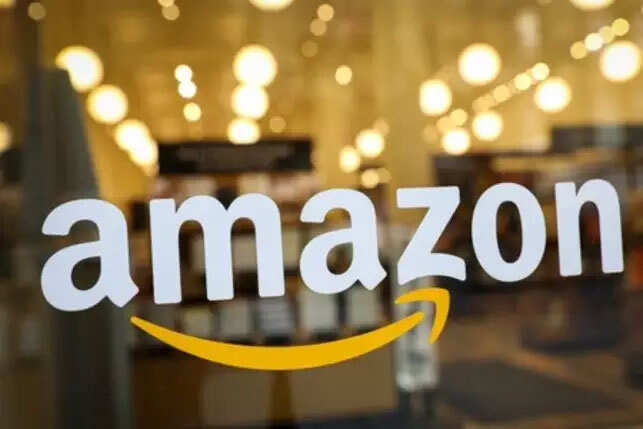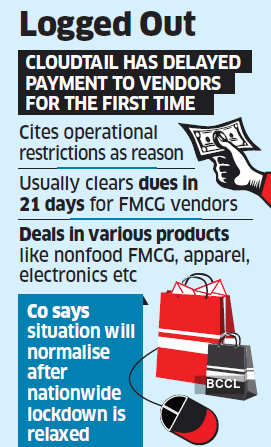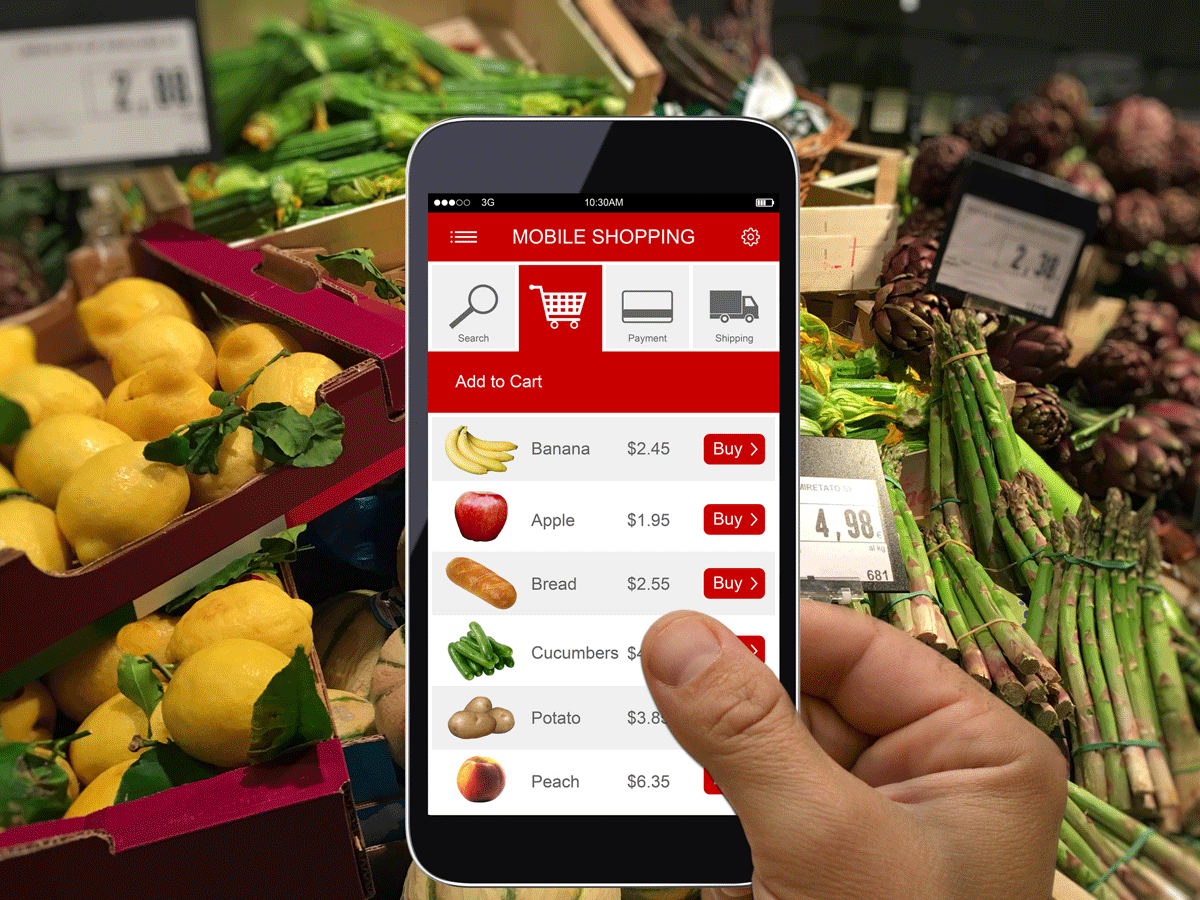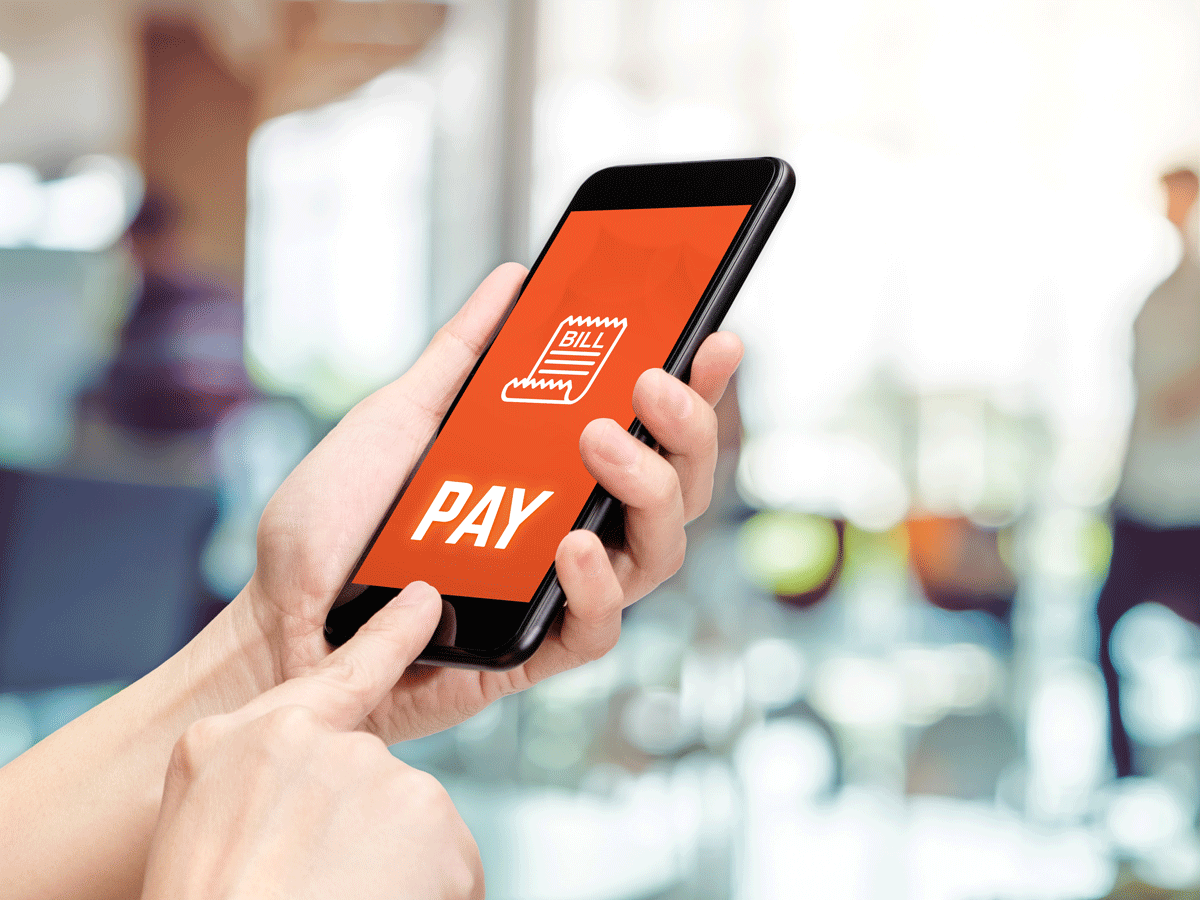 NEW DELHI: The Internet and Mobile Association of India (IAMAI) on Monday requested the government to open up e-commerce services amid the coronavirus lockdown.The Centre, in its order on April 15, had said e-commerce platforms would be allowed to sell non-essential items from April 20. However, on April 19, the government reversed its order and prohibited e-commerce platforms from selling non-essential items during the lockdown.Responding to the last minute announcement made by the ministry of home affairs, the IAMAI urged the government to reconsider its decision."IAMAI believes that the debate of online vs offline is an incorrect portrayal of the ground reality. There are lakhs of sellers from the physical markets across India who also sell online. In fact it is these medium & small offline enterprises that are powering the online e-commerce in a significant way," the association said in a statement."Resumption of one part of their business will help them with liquidity and will lead to larger restoration of demand,"it said, adding, "Besides, thousands of Kiranas are now leveraging E-commerce and its proven and safe supply chain for delivery to consumers. Today the only priority is to emphasize on 'Social Distancing' and e-commerce can support India's fight against Covid-19."The IAMAI statement said that after nearly a month of lockdown, the debate is not necessarily between what is 'essential' and what is 'non-essential' but the real debate is how not to choke demand completely when the country is going through a health crisis."The key to "returning to normal" is the fulfilment of consumer demand which under the present public health crisis can be effectively done through e-commerce," it maintained."IAMAI, therefore, strongly suggests that whatever can be delivered to the customer safely keeping in mind the health crisis, should be allowed immediately," the statement said.Subho Ray, president IAMAI, said: "Preservation of consumer demand is of prime importance that will keep the economy chugging along as the country starts the difficult process of economic recovery. This demand needs to be met and nurtured towards restoration rather than being suppressed to a future date. Online commerce is a safe and ready choice that is open to all sellers, including those who continue to see it is a threat. Lakhs of small sellers have embraced online channels and are today equipped to serve the country. Allowing full operations of e-commerce is the first step towards economic revival - one that helps buyers, but more importantly helps small businesses stay alive and start building towards a recovery."
NEW DELHI: The Internet and Mobile Association of India (IAMAI) on Monday requested the government to open up e-commerce services amid the coronavirus lockdown.The Centre, in its order on April 15, had said e-commerce platforms would be allowed to sell non-essential items from April 20. However, on April 19, the government reversed its order and prohibited e-commerce platforms from selling non-essential items during the lockdown.Responding to the last minute announcement made by the ministry of home affairs, the IAMAI urged the government to reconsider its decision."IAMAI believes that the debate of online vs offline is an incorrect portrayal of the ground reality. There are lakhs of sellers from the physical markets across India who also sell online. In fact it is these medium & small offline enterprises that are powering the online e-commerce in a significant way," the association said in a statement."Resumption of one part of their business will help them with liquidity and will lead to larger restoration of demand,"it said, adding, "Besides, thousands of Kiranas are now leveraging E-commerce and its proven and safe supply chain for delivery to consumers. Today the only priority is to emphasize on 'Social Distancing' and e-commerce can support India's fight against Covid-19."The IAMAI statement said that after nearly a month of lockdown, the debate is not necessarily between what is 'essential' and what is 'non-essential' but the real debate is how not to choke demand completely when the country is going through a health crisis."The key to "returning to normal" is the fulfilment of consumer demand which under the present public health crisis can be effectively done through e-commerce," it maintained."IAMAI, therefore, strongly suggests that whatever can be delivered to the customer safely keeping in mind the health crisis, should be allowed immediately," the statement said.Subho Ray, president IAMAI, said: "Preservation of consumer demand is of prime importance that will keep the economy chugging along as the country starts the difficult process of economic recovery. This demand needs to be met and nurtured towards restoration rather than being suppressed to a future date. Online commerce is a safe and ready choice that is open to all sellers, including those who continue to see it is a threat. Lakhs of small sellers have embraced online channels and are today equipped to serve the country. Allowing full operations of e-commerce is the first step towards economic revival - one that helps buyers, but more importantly helps small businesses stay alive and start building towards a recovery."
 New Delhi: Cloudtail India, one of the largest sellers on Amazon’s India marketplace, is delaying payments to brands and suppliers because the Covid-19 outbreak and the ensuing lockdown have hit business. Amazon is a minority stakeholder in the company.“Governmental restrictions given the Covid-19 outbreak and the advisory to sell only essential products have impacted our supply chain and restricted our operations,” Cloudtail said in an email to one of its large vendors that ET has seen. “In view of the same, please expect a delay in processing of your payment.”Cloudtail said it’s working with stakeholders to ensure that the disruption is minimised. “We are actively working with vendors, employees, marketplaces, banks and regulators to get through these testing times,” a Cloudtail spokesperson said in an email to ET.
New Delhi: Cloudtail India, one of the largest sellers on Amazon’s India marketplace, is delaying payments to brands and suppliers because the Covid-19 outbreak and the ensuing lockdown have hit business. Amazon is a minority stakeholder in the company.“Governmental restrictions given the Covid-19 outbreak and the advisory to sell only essential products have impacted our supply chain and restricted our operations,” Cloudtail said in an email to one of its large vendors that ET has seen. “In view of the same, please expect a delay in processing of your payment.”Cloudtail said it’s working with stakeholders to ensure that the disruption is minimised. “We are actively working with vendors, employees, marketplaces, banks and regulators to get through these testing times,” a Cloudtail spokesperson said in an email to ET. ‘In Constant Touch with Vendors’“We are in constant touch and are actively working with them to sort out the issues they face in respect of payments after the lockdown.”Cloudtail hasn’t made payments since March 23, according to various executives at large fast-moving consumer goods (FMCG) vendors and companies. They include an official at an FMCG multinational who directly handles the ecommerce accounts of various platforms, including Amazon and Flipkart. Cloudtail is generally not known to delay payments, said the people cited above.“This is an unprecedented crisis which has disrupted the lives of people and businesses at a very large scale,” Cloudtail told ET. “We understand and deeply empathise with the challenges faced by our vendor partners during this difficult period, due to this extraordinary, uncontrollable event that all of us are experiencing.”The Centre has restricted ecommerce companies to home deliveries of essential goods, forbidding them from selling so-called non-essentials. That has hit many sellers of items ranging from apparel to electronic goods such as Cloudtail, which is saddled with a large inventory of such goods, said the people cited above.“We expect the situation to normalise when the nationwide lockdown is relaxed and we resume regular operations,” Cloudtail said in its email to vendors.Cloudtail is owned by Prione Business Services, a joint venture between Infosys founder NR Narayana Murthy’s Catamaran Ventures, which has a 76% stake, and Amazon, which holds 24%. It posted revenue growth of 25% to Rs 8,945 crore and a profit of Rs 29.4 crore in FY19, according to regulatory filings.Cloudtail was in the news in 2018 after India amended its foreign direct investment rules for ecommerce marketplace and the joint venture had to change its shareholding structure to stay compliant with the changed norms. Amazon reduced its stake in Prione from 49% to 24% in February 2019 as part of this exercise.
‘In Constant Touch with Vendors’“We are in constant touch and are actively working with them to sort out the issues they face in respect of payments after the lockdown.”Cloudtail hasn’t made payments since March 23, according to various executives at large fast-moving consumer goods (FMCG) vendors and companies. They include an official at an FMCG multinational who directly handles the ecommerce accounts of various platforms, including Amazon and Flipkart. Cloudtail is generally not known to delay payments, said the people cited above.“This is an unprecedented crisis which has disrupted the lives of people and businesses at a very large scale,” Cloudtail told ET. “We understand and deeply empathise with the challenges faced by our vendor partners during this difficult period, due to this extraordinary, uncontrollable event that all of us are experiencing.”The Centre has restricted ecommerce companies to home deliveries of essential goods, forbidding them from selling so-called non-essentials. That has hit many sellers of items ranging from apparel to electronic goods such as Cloudtail, which is saddled with a large inventory of such goods, said the people cited above.“We expect the situation to normalise when the nationwide lockdown is relaxed and we resume regular operations,” Cloudtail said in its email to vendors.Cloudtail is owned by Prione Business Services, a joint venture between Infosys founder NR Narayana Murthy’s Catamaran Ventures, which has a 76% stake, and Amazon, which holds 24%. It posted revenue growth of 25% to Rs 8,945 crore and a profit of Rs 29.4 crore in FY19, according to regulatory filings.Cloudtail was in the news in 2018 after India amended its foreign direct investment rules for ecommerce marketplace and the joint venture had to change its shareholding structure to stay compliant with the changed norms. Amazon reduced its stake in Prione from 49% to 24% in February 2019 as part of this exercise.
 BENGALURU: BigBasket and Grofers, India’s biggest online grocers, have nearly doubled the number of daily deliveries compared with a month ago, as more consumers hit the internet to buy essentials amid the ongoing lockdown.
The surge has come despite shuttered warehouses in the early days of the lockdown that began on March 25 to stem the spread of the Covid-19 virus outbreak.
Elevated Demand
Supply and labour shortage also put a spanner in the works initially, reducing operating capacity to onetenth at these grocery etailers.
The teething troubles now seem to be over, although elevated demand will mean consumers shopping online for groceries will still have to wait for delivery slots.
Despite the bottlenecks, BigBasket said 283,000 orders a day are being met, up from 150,000 before the shutdown, while Grofers said it was servicing 190,000 daily orders against 100,000 before the crisis.
“Today, we deliver 2.83 lakh orders and are growing. Sadly, the expectation is three to six times this number... We are really trying our best,” Hari Menon, BigBasket's cofounder, wrote on microblogging platform Twitter on Monday.
Since many workers left for their hometowns just before the lockdown, planning and operations were disrupted, he said. “That was something we didn’t anticipate, which meant we couldn’t pick orders and deliver them in sufficient numbers to satisfy the 3-6X increase in demand,” Menon said.
BigBasket’s main rival Grofers said it has faced an unprecedented surge in demand during the lockdown. “After the initial hiccup in operations, we were able to scale up rapidly and have now served over 25 lakh households across 24 cities. Today, we are serving over 1.9 lakh orders a day and projecting this to increase by 50% in the coming month,” said Albinder Dhindsa, cofounder, Grofers.
It is ramping up supplies from brands and manufacturing partners to meet demand, he added. Both BigBasket and Grofers are also expected to hire big in the coming weeks. While BigBasket will take on board 10,000 new workers, Grofers will hire 4,500 workers in the next two weeks after having added 2,500 already, ET reported earlier.
Horizontal Thrust
Horizontal marketplaces Flipkart and Amazon have also muscled into the online grocery space. Walmart-owned Flipkart has scaled up delivery of groceries to nearly 400 cities from five cities prior to the lockdown, a company executive told ET.
The Food Safety and Standards Authority of India (FSSAI) had given provisional approvals to stock packaged food items at its 125-odd warehouses and the company is now delivering more grocery orders than before, the executive said.
Amazon, which has had a headstart over Flipkart in the groceries category, stopped accepting orders for its Pantry services across 100 cities, leading to a backlash from consumers. However, the situation has improved, it said.
The company said Pantry is up and running in 85 cities now, while its two-hour delivery service Fresh is operational in the six cities it is present in. “In the last one week, we have added more than 60 cities that get essential products through Amazon Pantry, taking the total number of cities to over 85,” Amazon said in a statement. “Customer demand in all these cities is more than 2x pre-lockdown...”
Social commerce startup Meesho, etailers Paytm Mall, Shopclues and Snapdeal, and real-estate firms such as NoBroker have also diversified into the grocery space, ET reported on April 9. Food-delivery apps Zomato and Swiggy, too, have doubled down on the grocery category since it began seeing an uptick in demand. While Swiggy was already present in the grocery delivery segment, Zomato tied up with Grofers to launch the services.
BENGALURU: BigBasket and Grofers, India’s biggest online grocers, have nearly doubled the number of daily deliveries compared with a month ago, as more consumers hit the internet to buy essentials amid the ongoing lockdown.
The surge has come despite shuttered warehouses in the early days of the lockdown that began on March 25 to stem the spread of the Covid-19 virus outbreak.
Elevated Demand
Supply and labour shortage also put a spanner in the works initially, reducing operating capacity to onetenth at these grocery etailers.
The teething troubles now seem to be over, although elevated demand will mean consumers shopping online for groceries will still have to wait for delivery slots.
Despite the bottlenecks, BigBasket said 283,000 orders a day are being met, up from 150,000 before the shutdown, while Grofers said it was servicing 190,000 daily orders against 100,000 before the crisis.
“Today, we deliver 2.83 lakh orders and are growing. Sadly, the expectation is three to six times this number... We are really trying our best,” Hari Menon, BigBasket's cofounder, wrote on microblogging platform Twitter on Monday.
Since many workers left for their hometowns just before the lockdown, planning and operations were disrupted, he said. “That was something we didn’t anticipate, which meant we couldn’t pick orders and deliver them in sufficient numbers to satisfy the 3-6X increase in demand,” Menon said.
BigBasket’s main rival Grofers said it has faced an unprecedented surge in demand during the lockdown. “After the initial hiccup in operations, we were able to scale up rapidly and have now served over 25 lakh households across 24 cities. Today, we are serving over 1.9 lakh orders a day and projecting this to increase by 50% in the coming month,” said Albinder Dhindsa, cofounder, Grofers.
It is ramping up supplies from brands and manufacturing partners to meet demand, he added. Both BigBasket and Grofers are also expected to hire big in the coming weeks. While BigBasket will take on board 10,000 new workers, Grofers will hire 4,500 workers in the next two weeks after having added 2,500 already, ET reported earlier.
Horizontal Thrust
Horizontal marketplaces Flipkart and Amazon have also muscled into the online grocery space. Walmart-owned Flipkart has scaled up delivery of groceries to nearly 400 cities from five cities prior to the lockdown, a company executive told ET.
The Food Safety and Standards Authority of India (FSSAI) had given provisional approvals to stock packaged food items at its 125-odd warehouses and the company is now delivering more grocery orders than before, the executive said.
Amazon, which has had a headstart over Flipkart in the groceries category, stopped accepting orders for its Pantry services across 100 cities, leading to a backlash from consumers. However, the situation has improved, it said.
The company said Pantry is up and running in 85 cities now, while its two-hour delivery service Fresh is operational in the six cities it is present in. “In the last one week, we have added more than 60 cities that get essential products through Amazon Pantry, taking the total number of cities to over 85,” Amazon said in a statement. “Customer demand in all these cities is more than 2x pre-lockdown...”
Social commerce startup Meesho, etailers Paytm Mall, Shopclues and Snapdeal, and real-estate firms such as NoBroker have also diversified into the grocery space, ET reported on April 9. Food-delivery apps Zomato and Swiggy, too, have doubled down on the grocery category since it began seeing an uptick in demand. While Swiggy was already present in the grocery delivery segment, Zomato tied up with Grofers to launch the services.
 New Delhi : The number of cash-on-delivery orders is likely to go down as the coronavirus crisis subsides, according to a poll of senior e-commerce industry professionals done by ClickPost.Around 76 per cent of professionals said that the share of cash-on-delivery orders will go down post-Covid. Further, most of the professionals were of the view that the number QR code based transactions would increase.The poll also showed that 81 per cent of respondents said that share of e-commerce in India's retail market will increase, driven by both increases in e-commerce sales and decrease in offline sales.Further, in an online conference hosted recently by ClickPost on the short to medium term impact of COVID-19 on e-commerce, sector players said that that brands should first focus on clearing their inventory as the nationwide lockdown is lifted or the relaxed.The industry players were also of the view that companies should focus on conserving cash and driving repeat purchase which is usually cheaper than new customer acquisition.
New Delhi : The number of cash-on-delivery orders is likely to go down as the coronavirus crisis subsides, according to a poll of senior e-commerce industry professionals done by ClickPost.Around 76 per cent of professionals said that the share of cash-on-delivery orders will go down post-Covid. Further, most of the professionals were of the view that the number QR code based transactions would increase.The poll also showed that 81 per cent of respondents said that share of e-commerce in India's retail market will increase, driven by both increases in e-commerce sales and decrease in offline sales.Further, in an online conference hosted recently by ClickPost on the short to medium term impact of COVID-19 on e-commerce, sector players said that that brands should first focus on clearing their inventory as the nationwide lockdown is lifted or the relaxed.The industry players were also of the view that companies should focus on conserving cash and driving repeat purchase which is usually cheaper than new customer acquisition.
 New Delhi : Advocacy group US-India Strategic Partnership Forum (USISPF) has sought clarification from the central government whether e-commerce companies are also permitted to sell books and fans as those items were on Tuesday included in the list of essential items that can be sold during the lockdown period.On Tuesday, the Ministry of Home Affairs allowed shops selling books and electric fans to operate for business as part of essential items.“We seek your guidance on whether e-commerce platforms will be allowed to sell educational books for students,” the USISPF wrote in a letter to home secretary Ajay Kumar Bhalla on Wednesday.“This will allow those unable to reach book stores to continue their education unhindered.” In the letter, the USISPF has requested the government to also allow online marketplaces to sell electric fans.“With the kind of summers we face in India the bare minimum product that is required in every household in India is an electric fan,” the letter signed by Mukesh Aghi, president of the group said. “Whilst the same has been made available via regular supply chain modes, we would like to urge you to consider allowing e-commerce entities to make the same available on their platforms as well.”
New Delhi : Advocacy group US-India Strategic Partnership Forum (USISPF) has sought clarification from the central government whether e-commerce companies are also permitted to sell books and fans as those items were on Tuesday included in the list of essential items that can be sold during the lockdown period.On Tuesday, the Ministry of Home Affairs allowed shops selling books and electric fans to operate for business as part of essential items.“We seek your guidance on whether e-commerce platforms will be allowed to sell educational books for students,” the USISPF wrote in a letter to home secretary Ajay Kumar Bhalla on Wednesday.“This will allow those unable to reach book stores to continue their education unhindered.” In the letter, the USISPF has requested the government to also allow online marketplaces to sell electric fans.“With the kind of summers we face in India the bare minimum product that is required in every household in India is an electric fan,” the letter signed by Mukesh Aghi, president of the group said. “Whilst the same has been made available via regular supply chain modes, we would like to urge you to consider allowing e-commerce entities to make the same available on their platforms as well.”
 Kolkata : After a slump in business from brick and mortar stores during the Covid-19 induced lockdown,an organization of traditional small traders on Wednesday claimed that it would launch an e-commerce portal for essentials "in a day or two" in association with its partners. An official of the Confederation of All India Traders (CAIT) that represents seven crore traders and 40,000 trade associations said the project aims at delivering essential items to the doorstep of a customer by a neighbour hood store."A pilot has been going on in six cities of Allahabad,Delhi, Jhasi, Varanasi, Gorakhpur, Lucknow for the past seven days involving around 800 local traders. We are planning a pan-India launch with a target of involving one lakh traders and stores in a day or two," CAIT West Bengal general secretary Rabi Shankar Roy told .Only essential items would be delivered through the E-Lala portal during the lockdown and after it is lifted, thee-commerce site will also deal with non-essentials, he said.Bengal based traders body, Confederation of West Bengal Trade Association, said they are taking steps to empower consumers with details of local stores in their website and proposed to join the e-commerce bandwagon at a later stage, its president Sushil Poddar said.Connecting consumers with neighbourhood stores will help maintain social distancing without any travel hurdles, he said.Roy said Global Linkers is the technology partner of E-Lala while Consumer Products Distributors Federation and All India Transporters Welfare Association are part of the ecosystem.He said it is free for traders to be on board while consumers will have to pay a small delivery charge for home delivery by the local store.Roy said CAIT has launched a nationwide campaign for collecting data of seven crore traders and their employees.
Kolkata : After a slump in business from brick and mortar stores during the Covid-19 induced lockdown,an organization of traditional small traders on Wednesday claimed that it would launch an e-commerce portal for essentials "in a day or two" in association with its partners. An official of the Confederation of All India Traders (CAIT) that represents seven crore traders and 40,000 trade associations said the project aims at delivering essential items to the doorstep of a customer by a neighbour hood store."A pilot has been going on in six cities of Allahabad,Delhi, Jhasi, Varanasi, Gorakhpur, Lucknow for the past seven days involving around 800 local traders. We are planning a pan-India launch with a target of involving one lakh traders and stores in a day or two," CAIT West Bengal general secretary Rabi Shankar Roy told .Only essential items would be delivered through the E-Lala portal during the lockdown and after it is lifted, thee-commerce site will also deal with non-essentials, he said.Bengal based traders body, Confederation of West Bengal Trade Association, said they are taking steps to empower consumers with details of local stores in their website and proposed to join the e-commerce bandwagon at a later stage, its president Sushil Poddar said.Connecting consumers with neighbourhood stores will help maintain social distancing without any travel hurdles, he said.Roy said Global Linkers is the technology partner of E-Lala while Consumer Products Distributors Federation and All India Transporters Welfare Association are part of the ecosystem.He said it is free for traders to be on board while consumers will have to pay a small delivery charge for home delivery by the local store.Roy said CAIT has launched a nationwide campaign for collecting data of seven crore traders and their employees.
 NEW DELHI: The Internet and Mobile Association of India (IAMAI) on Monday requested the government to open up e-commerce services amid the coronavirus lockdown.
NEW DELHI: The Internet and Mobile Association of India (IAMAI) on Monday requested the government to open up e-commerce services amid the coronavirus lockdown.




